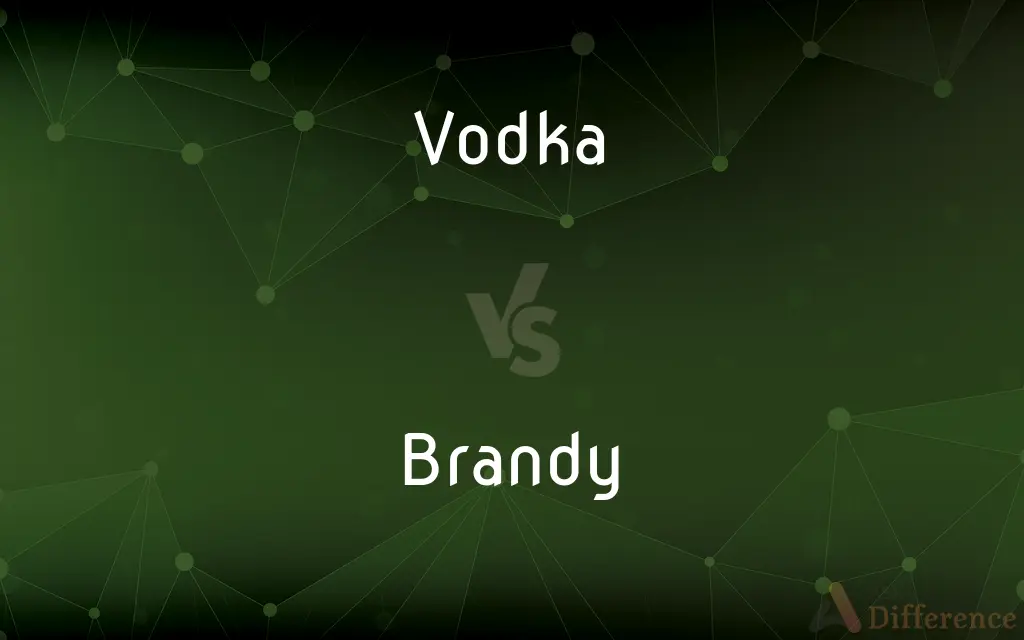Vodka vs. Brandy — What's the Difference?
By Tayyaba Rehman & Urooj Arif — Published on February 5, 2024
Vodka is a clear, distilled spirit, typically grain or potato-based, neutral in flavor. Brandy is distilled from wine or fermented fruit juice, aged in wood, with a rich, sweet profile.

Difference Between Vodka and Brandy
Table of Contents
ADVERTISEMENT
Key Differences
Vodka, known for its clear, neutral flavor, is versatile in cocktails, allowing other ingredients to shine. Brandy, with its deep, fruity essence, adds a rich layer to drinks, often enjoyed neat to savor its complexity.
Brandy's aging process in wooden casks imparts distinct flavors and a smooth finish, making it a favorite for sipping. Vodka, on the other hand, prides itself on purity and smoothness, often distilled multiple times to achieve a clean taste.
The production of vodka involves fermentation of grains or potatoes, followed by multiple distillations to remove impurities. Brandy starts with wine or fermented fruit juice, distilled to concentrate the flavor, then aged to perfection.
Vodka is celebrated for its clarity and minimal aftertaste, making it a staple in bars worldwide. Brandy, with its nuanced flavors from aging, is often associated with luxury and tradition, enjoyed in a snifter to enhance its aroma.
Cultural significance varies, with vodka being a cornerstone in Eastern European traditions, symbolizing hospitality and celebration. Brandy's roots are deeply entwined with Western European heritage, often enjoyed in social gatherings as a symbol of sophistication.
ADVERTISEMENT
Comparison Chart
Base Ingredient
Made from grains or potatoes.
Distilled from wine or fermented fruit juice.
Flavor Profile
Neutral, with little to no distinct flavor.
Rich, fruity, and often with notes from aging barrels.
Common Consumption
Often mixed in cocktails or consumed neat.
Typically sipped neat, especially aged varieties.
Aging Process
Generally not aged.
Aged in wooden casks, contributing to flavor.
Cultural Significance
Integral to Eastern European traditions.
Associated with Western European luxury and tradition.
Compare with Definitions
Vodka
Known for its neutral flavor, making it versatile in mixed drinks.
In the cocktail class, they learned how vodka could be the base for countless recipes.
Brandy
A distilled spirit made from wine or fermented fruit, aged in wood.
The brandy, with its deep amber hue, was poured into the snifter with care.
Vodka
A staple in global bars for its versatility and mixability.
The bartender's skill was evident in the way he crafted diverse drinks with just one bottle of vodka.
Brandy
Associated with tradition and sophistication in social settings.
At the formal dinner, brandy was served as a sign of hospitality and elegance.
Vodka
Often consumed neat or chilled in traditional settings.
At the gathering, guests toasted with shots of chilled vodka, a nod to tradition.
Brandy
Aged varieties are prized for their depth and smooth finish.
The vintage brandy, aged for decades, was the crown jewel of the collector's cellar.
Vodka
A clear, high-purity spirit distilled from grains or potatoes.
The martini was made with premium vodka, stirred to perfection.
Brandy
Can be fruit-based, with popular varieties including apple and grape.
The apple brandy offered a sweet, aromatic contrast to the evening's savory dishes.
Vodka
Frequently distilled multiple times for smoothness and purity.
The smooth taste of the vodka was attributed to its five-fold distillation process.
Brandy
Often enjoyed neat to appreciate its complex flavors and aroma.
In the quiet of the evening, he savored the brandy, noting its rich notes of oak and vanilla.
Vodka
An alcoholic liquor originally distilled from fermented wheat mash but now also made from a mash of rye, corn, or potatoes.
Brandy
An alcoholic liquor distilled from wine or fermented fruit juice.
Vodka
A clear distilled alcoholic liquor made from grain mash.
Brandy
To preserve, flavor, or mix with brandy.
Vodka
A serving of the above beverage.
Brandy
(uncountable) An alcoholic liquor distilled from wine or fermented fruit juice.
Vodka
Neutral spirits distilled (or treated after distillation) so as to have no distinctive character, aroma, taste, or color.
Brandy
(countable) Any variety of brandy.
Vodka
A Russian drink distilled from rye.
Brandy
(countable) A glass of brandy.
Vodka
Unaged colorless liquor originating in Russia
Brandy
(transitive) To preserve, flavour, or mix with brandy.
Brandy
A strong alcoholic liquor distilled from wine. The name is also given to spirit distilled from other liquors, and in the United States to that distilled from cider and peaches. In northern Europe, it is also applied to a spirit obtained from grain.
Brandy
Distilled from wine or fermented fruit juice
Common Curiosities
What distinguishes aged brandy from regular brandy?
Aged brandy is stored in wooden casks for a period, gaining complex flavors and a smoother finish, while regular brandy might not be aged or aged for a shorter time.
Can vodka be flavored?
Yes, vodka can be infused with a variety of flavors, from fruits to spices, enhancing its versatility in cocktails.
How is brandy produced?
Brandy is produced by distilling wine or fermented fruit juice and often aged in wooden casks.
How should brandy be served to enhance its flavors?
Brandy is best served at room temperature in a snifter glass to concentrate its aromas and flavors.
What role does the distillation process play in vodka's flavor?
The distillation process in vodka production is crucial for achieving its characteristic purity and neutrality in flavor.
How does the base ingredient affect the taste of vodka?
The base ingredient can subtly influence the texture and finish of vodka, with grain-based vodkas being slightly sweeter and potato-based vodkas being more earthy.
What is the significance of the region in brandy production?
The region can significantly influence brandy's flavor, with factors like local climate, soil, and grape varieties contributing to its unique character.
What is the origin of vodka?
Vodka has its origins in Eastern Europe, particularly in Russia and Poland.
What is vodka made from?
Vodka is typically made from grains such as wheat, corn, or potatoes.
Is vodka always clear?
Vodka is typically clear, but flavored varieties may have a slight tint depending on the ingredients used.
What types of fruit can be used to make brandy?
Brandy can be made from various fruits, including grapes, apples, and pears, each imparting its unique flavor profile.
Why is aging important for brandy?
Aging in wooden casks is important for brandy as it develops the spirit's color, flavor, and smoothness.
How has the production of vodka and brandy evolved over time?
Production techniques for both vodka and brandy have evolved with advancements in distillation and aging, leading to a wider variety of styles and qualities.
Can vodka be aged like brandy?
While not common, some vodkas are aged in barrels, but the aging process is typically shorter and less influential than in brandy.
What is the alcohol content range for vodka and brandy?
Both vodka and brandy generally have an alcohol content ranging from 35% to 60% by volume.
Share Your Discovery

Previous Comparison
Object in C++ vs. Class in C++
Next Comparison
Rooster vs. CaponAuthor Spotlight
Written by
Tayyaba RehmanTayyaba Rehman is a distinguished writer, currently serving as a primary contributor to askdifference.com. As a researcher in semantics and etymology, Tayyaba's passion for the complexity of languages and their distinctions has found a perfect home on the platform. Tayyaba delves into the intricacies of language, distinguishing between commonly confused words and phrases, thereby providing clarity for readers worldwide.
Co-written by
Urooj ArifUrooj is a skilled content writer at Ask Difference, known for her exceptional ability to simplify complex topics into engaging and informative content. With a passion for research and a flair for clear, concise writing, she consistently delivers articles that resonate with our diverse audience.












































